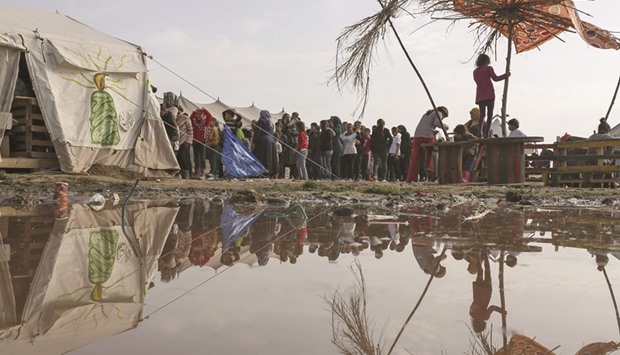As a paramedic, Reiko Poeschl has seen his share of suffering.
Nevertheless his experiences with refugees on Greece’s border with Macedonia will stay with him forever.
“I’ve worked for the emergency services for 20 years, and I’ve seen a lot and experienced a lot of suffering,” the 48-year-old German Red Cross staffer says.
Poeschl and his comrades from seven different countries have been working in two camps, where tens of thousands have been stranded since the countries in the Balkans began closing their borders to anyone without a valid passport and visa.
They have set up two health centres to provide medical care.
Poeschl says that the hygiene and disease patterns he has seen here can only be compared with what he saw in the South African townships.
“The images on television are not misleading,” Poeschl says of conditions in the border village of Idomeni.
The refugees and migrants are enduring appalling conditions.
He and his colleague Rene Illig have done most of their work in the camps of Cherso and Nea Kavala some 30km away.
“By contrast with Idomeni, there is a certain structure in place here,” he says.
The two health centres, which have been brought in from Germany, are now able to treat an average of 140 patients a day.
The queues are never-ending, and many of the patients are children.
The teams also try to ensure a minimum of hygiene in the camps.
The refugees and migrants are suffering the effects of life in tents, amid mud, rain and cold nights.
Apart from colds, skin ailments are frequent, Poeschl says.
These range from scratches through lice and blistered feet to wounds that have become infected.
“Everything that indicates poor hygiene over an extended period, and everything that can happen if you are on the move for a long time and are unable to look after yourself physically,” Poeschl says.
On occasion, the doctors and nurses have an acute emergency to deal with, and there is even a midwife on hand to help in the event of a birth.
Poeschl and Illig have no idea how many people from far afield will one day have Idomeni, Nea Kavala or Cherso stated as their place of birth on official documents.
Conditions at Nea Kavala and Cherso have improved, they say.
Previously there were just 60 portable toilets for 3,500 refugees and migrants.
“Since Easter there has been a real push. The Greeks have invested a lot in infrastructure, laid pipes for water and even built a lovely children’s playground,” Poeschl says.
Illig says he would certainly do something similar again.
“It touches you personally, and you take your experiences back with you,” the 44-year-old father says.
Looking at the many children in the camps, he often thinks of his two-year-old at home.
“You see similarities, and you have the feeling that you simply have to help,” he says.
Their tours last 14 days without a break. They work 12 hours a day.
But their efforts are appreciated. The language barrier means that most communication is in sign language.
“You are smiled at, and many place their hands on their hearts to say thank you,” Poeschl says.
The local Greeks have also welcomed the aid workers, offering them coffee on their way to work and even inviting them to meals.
The Red Cross symbol draws positive attention all round.
“An elderly man embraced me and kissed me,” Poeschl says.

People queue to receive food at a makeshift camp for migrants and refugees at the Greek-Macedonian border, near the Greek village of Idomeni.
